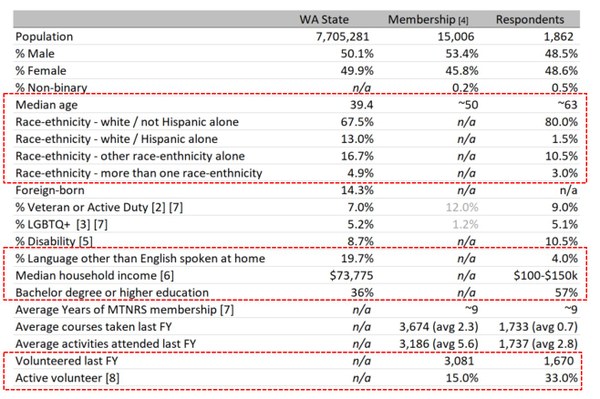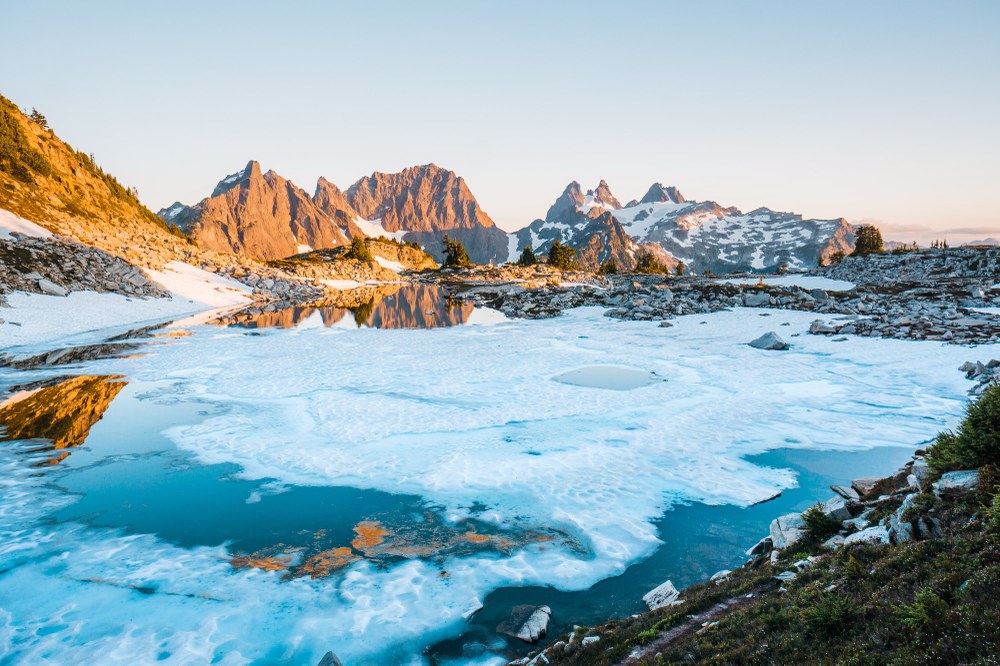
In January 2022, we invited our members and volunteers to participate in our bi-annual community survey. We do this every two years to understand how perceptions and experiences change over time, and to identify areas of need and allocate resources accordingly.
We first launched this survey in 2011, and have since reported on our findings from 2014, 2016, 2018, and 2020. We compare new responses with past survey data to track patterns and to identify opportunities to improve. We use your responses to help understand the needs of our community and to learn where we need to allocate more resources. Based on your feedback in the last five years, we’ve launched Alpine Ambassadors, the Leadership Development Series, our Public Lands 101 eLearning course, our Equity & Inclusion work, and more.
We typically receive a high response rate to this important survey, and 2022 was no exception. The survey was conducted from January 19 through February 13, 2022, with all members in good standing aged 18 and older receiving a personalized invitation to participate. Overall, 16% of the 14,400 people emailed responded. To put this in perspective, generally a 2-3% response rate is considered a strong response rate.
Before we dive into the key findings, I want to express a sincere appreciation for Daniel Poor, our volunteer data analyst on this project. His expertise was key to a number of the findings shared here, and he will be deeply involved in the deeper analysis to come.
Executive Summary
- Even though we had a high response rate, the responses are not considered representative of our membership.
- The community was overwhelmingly satisfied with how The Mountaineers responded to the COVID-19 pandemic, and we continue to trend high in satisfaction, recommendation, and intent to renew.
- People consistently join The Mountaineers to learn new skills and participate in new activities. Members and volunteers renew for skills and activities and to support our mission.
- Our membership is largely unfamiliar with the new strategic programs we’ve launched in the last five years, and we have the opportunity to grow awareness.
- Our volunteers place high value on opportunities for training and personal/professional development, and would like more investment in technology improvements and administrative support.
- Members and volunteers continue to request more transparent and uniform processes for things that are preventing them from getting involved. The biggest pain point is around earning equivalency, both for members with skills earned elsewhere and for volunteers who want to lead other activities (eg: a scramble leader who wants to be a hike leader).
- Our community expressed a strong desire to continue working toward a culture where all people feel a sense of belonging.
Representative Sample of Respondents
Our respondents skewed older, more female, had a longer tenure of membership, and were more likely to be volunteers than our overall membership. We also had proportionally less participation from our Seattle branch, with more representation from other branches. (General membership data reflected in blue; survey takers reflected in orange.)
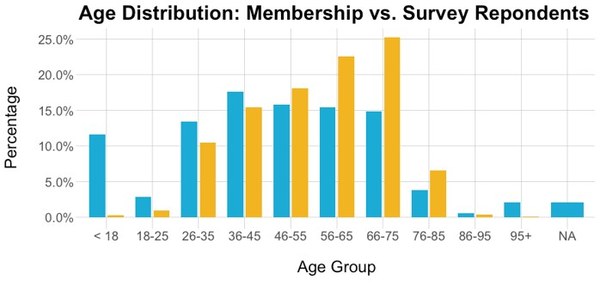
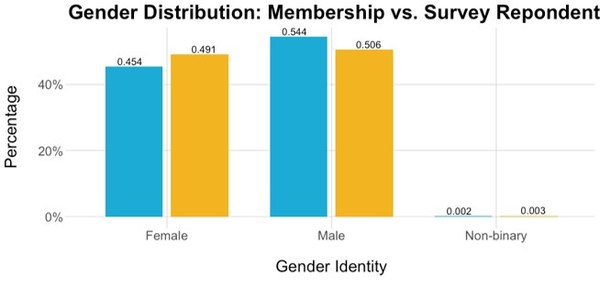
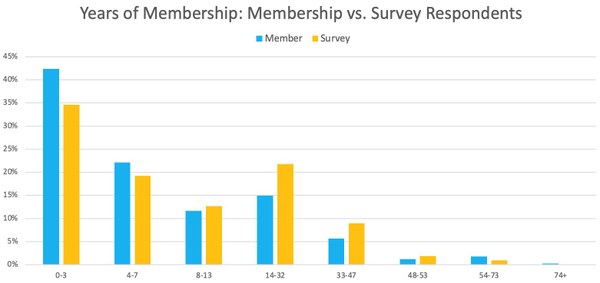
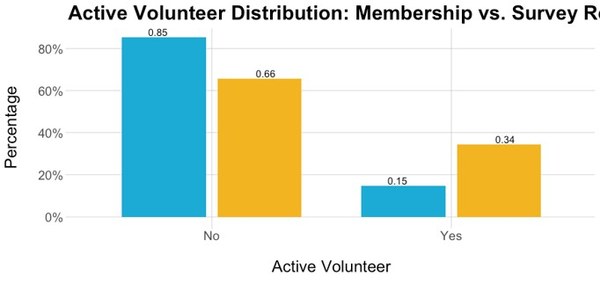
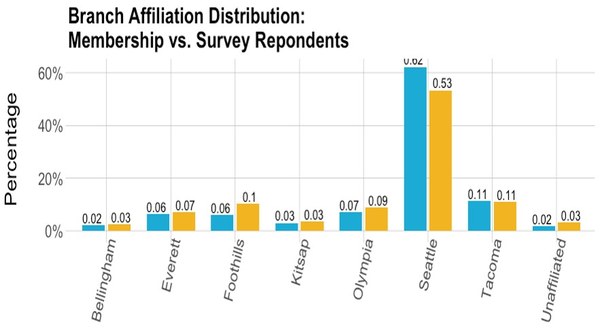 We understand that folks are missing from the survey results, and that their views are not represented. In the future, we hope to find ways to hear these perspectives, either through additional outreach for this survey or through other methods.
We understand that folks are missing from the survey results, and that their views are not represented. In the future, we hope to find ways to hear these perspectives, either through additional outreach for this survey or through other methods.
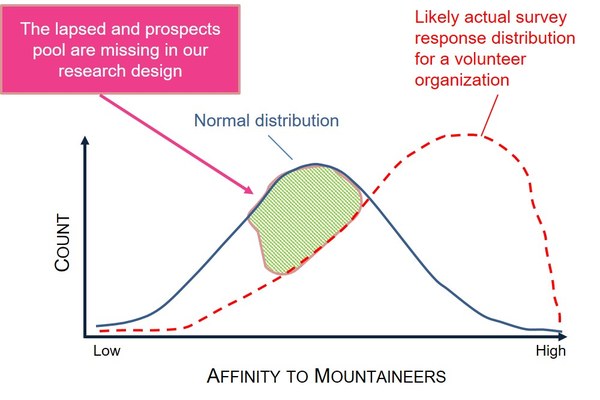 To help us understanding how we’re tracking toward a representative sample, we are also tracking the overall demographics of our membership and our respondents, and how those rank compared to Washington State.
To help us understanding how we’re tracking toward a representative sample, we are also tracking the overall demographics of our membership and our respondents, and how those rank compared to Washington State.
Of our 15,000 individual members, classified as people who have paid dues in the last 13 months, roughly half are active as participants in a given year. The other half do not actively participate in programs, yet continue to support The Mountaineers because of their connection to our mission. The average membership lasts 11 years, but we have a large group of folks who are part of our 50+ year club.
Of the 7,500 active members, roughly 2,500 are classified as active volunteers, having led in the previous 12 months or on the schedule to lead in the next 12 months.
Recommendation & Renewal Intent
We continue to trend high in satisfaction, recommendation, and intent to renew, although we saw a slight dip in satisfaction since 2020, likely due to the lack of available opportunities because of the pandemic. Because people join The Mountaineers to participate in programming, we are not surprised to see that member satisfaction specifically has fallen slightly, given the stark decrease in programming in 2020-2021 because of COVID-19.
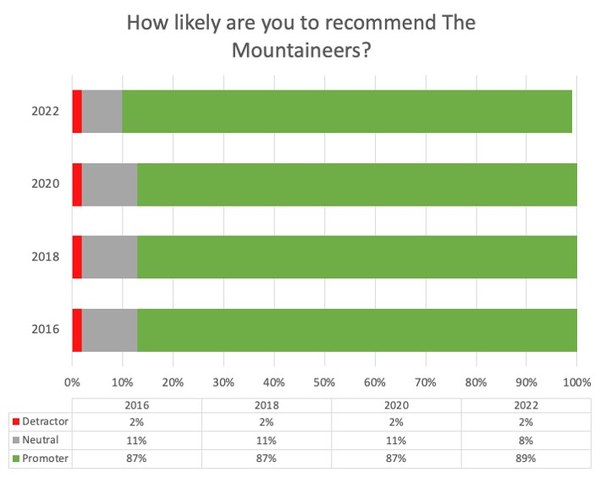
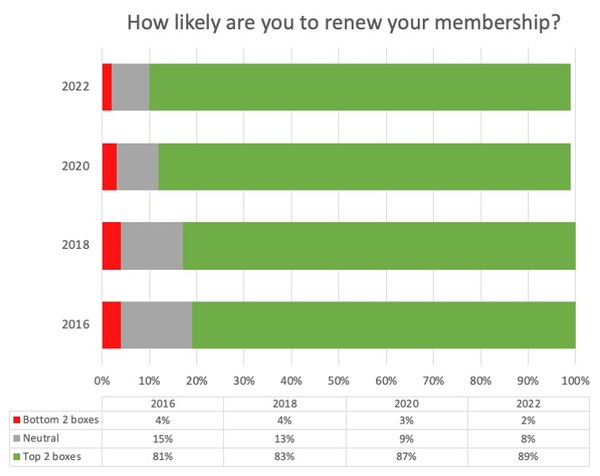
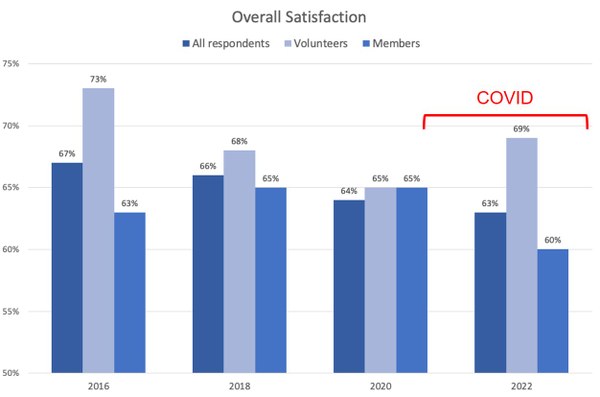
COVID-19
While we hope not to see another global pandemic in the future, we felt it was important to understand how our response to COVID-19 matched the expectations of Mountaineers members. We were happy to see that our community was largely satisfied with how The Mountaineers responded to the COVID-19 pandemic, with 96% reporting they were either very satisfied (23%), satisfied (41%), or neutral (32%) toward our response.
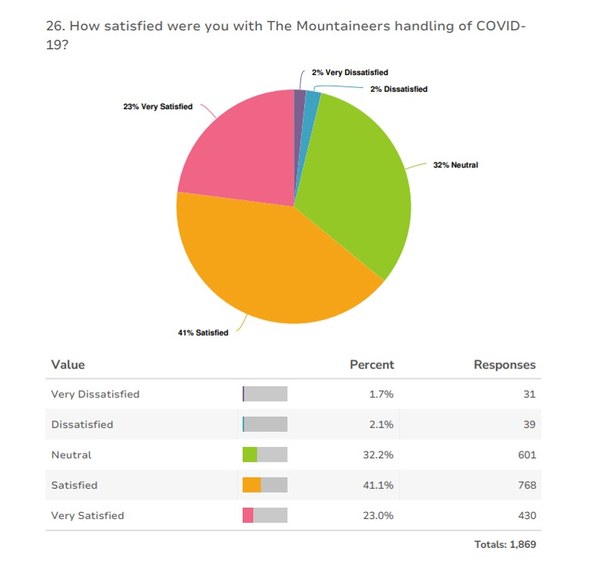
We were also interested in participation data. Roughly 55% of respondents said they participated less due to the pandemic, and the same percentage indicated they intended to participate more once the pandemic subsides.
Affinity, Access, & Perceptions
People most frequently learn about The Mountaineers through word of mouth, although an increasing number of new members hear about us through our website and Mountaineers Books. Consistently, people join to learn skills or find opportunities to get outside. When people choose to renew, they most often cite skills and activities, but are also likely to renew to support our mission and our conversation and advocacy efforts. All three national parks in Washington State were founded in part through the support of Mountaineers members. We’re proud of this legacy, and hope to carry it forward as we work toward equitable outdoor access for all people.
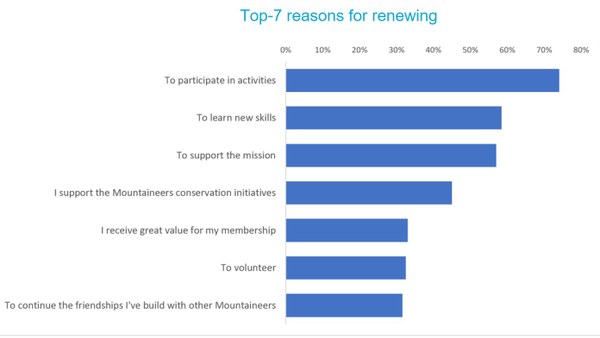
Perceptions of The Mountaineers have improved since 2011, and people see The Mountaineers as a place to learn new skills, to find opportunities to recreate safely in groups, and as a place that offers good value. We’re also happy that people see us as a nonprofit working toward important conservation causes and as a place to make lifelong friends.
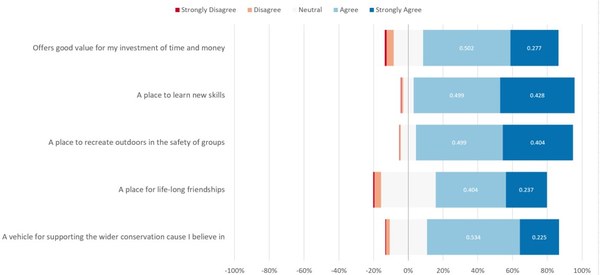
Strategic Plan
Because we are in the process of refreshing our Vision 2022 strategic plan, which was built based on feedback from our community, we wanted to ask our membership how much they knew and cared about our strategic plan programs. The findings are not surprising: people care about all different aspects of our mission, but do not have high awareness of the strategic programs we launched in response to the Vision 2022 plan.
Ultimately, we hope to continue growing these programs, and to build new ones, in response to the feedback from our community. If you’d like to learn more, we encourage you to dive in:
- Alpine Ambassadors
- Climb Leader Progression
- Mountain Education Alliance
- Carbon Footprint Reduction Committee
- Outdoor Alliance/Outdoor Alliance Washington
- Public Lands 101 eLearning course
- Leadership Development Series
- Mini Mountaineers
- Break Camps
- Equity & Inclusion work
Ongoing Volunteer Support
A significant portion of our survey is related to volunteers, and their experiences within different areas of our organization. A team of staff members are already diving into the different pieces of feedback from volunteers to identify the biggest opportunity areas to provide additional support.
We are also hiring for an additional Member Services Associate to help support our members and volunteers to make it easier to get involved and provide outdoor learning opportunities. Our staff was cut by 20% due to the pandemic, and while we are not yet back up at pre-pandemic operational capacity, we know the most important investment we can make is in our community.
Feedback
We are always grateful to everyone for participating in this survey, and in particular for taking extra time to offer written feedback to provide more personalized examples of their experiences not represented in the questionnaire. At the end of our survey we always ask, “Do you have anything else you want to say about The Mountaineers?” In most surveys, 0.005% of people answer this question. Well, not at The Mountaineers! We received nearly 600 comments out of 1,900 responses – a 32% response rate.
We are still analyzing these responses at the end of our survey, but wanted to share a few comment with you made throughout the survey:
Training & Tools for leaders
- “More frequent training on website and other technology tools. Develop a more standardized set of leadership soft skills requirements for volunteer activity leaders and deliver the training.”
- “It is very unclear to volunteers what resources are available through the Mountaineers. While some technology, such as Basecamp or The Mountaineer's website is available, it's unclear where the differentiation between paid Mountaineers staff and volunteer responsibilities lies. It is also unclear who volunteers can go to for support in role training, conflict resolution, and DEI topics with the exception of some periodically offered leadership seminars/clinics on these topics, which are primarily activity/outdoors focused and not on volunteerism/admin within the organization. There is little to no resources available which I am aware of for volunteer recruitment or recognition, and I personally have seen many people burnout from committee duties due to the hours required to put on a course without having the above addressed. Due to this, I do not feel the Mountaineers are largely set-up to value the sustainability of their volunteers, and would like to see many changes in the servant-leadership direction.”
- “With limited resources you cannot continually expand services and programs. Important to sustain the programs that have been the core of the Mountaineer organization (look back 50 years ago), then support the volunteers with adequate resources.”
Culture of Belonging
- “Increase presence of women in leadership positions and increase BIPOC [Black, Indigenous, and People of Color] membership and participation.”
- “We need to make our branches/spaces/events safe for everyone that participates. This is referring to being safe from people who are doing bad things and treating people in ways that are directly against The Mountaineer core values and mission. We are losing so many amazing people at the branch program level because there are some bad people who are making others feel unwelcome, unsafe, etc. We need support from the paid staff to have guidelines and ways to handle this easily & efficiently. How can we attract new members within minority groups, if we don't have positive environments set up where they can experience The Mountaineers in a positive way?”
- “[Increase] scholarship and outreach to underrepresented communities.”
- “For the 55+ age group: the program needs to be more comprehensive to address those, like myself, who would like to do activities and courses with peers and be able to find such activities on the webpage.”
Red Tape
- “Look at barriers for new leaders and implement processes to reduce them. For example, backpacking leader required leading a mentored hike first. It should be the other way around if someone is interested in leading backpacks go straight to the mentored backpack and automatically give all backpack leaders a hike leader badge as well as they have already demonstrated competence.”
- “Allow students that have completed scrambling, glacier, basic to be qualified as assistant hike, snowshoe, backpack leader for the youth groups. I have completed scramble, glacier, basic yet I'm not qualified to lead hikes or be an assistant. If I want to be updated I need to go on a basic hike which I've done many times through my other classes. I feel there are qualified leaders right now that would be happy to volunteer.”
Accolades
- “I'm impressed with the continued improvement of the organization's programs, outreach and dedication to so many healthy activities benefiting so many.”
- “I love The Mountaineers. Please keep up the good work through these tough times. I really enjoyed all the online course opportunities during Covid. Thank you for those classes.”
- “Staff does an extraordinary job connecting with volunteers and constantly innovating in their support by good listening. The club still has a big opportunity to reduce barriers to collaboration and to find ways to develop more space so that any member can get training.”
Poop. really!
- “Seriously, teach people how to poop in the woods. Get vendors involved. Nobody should be able to buy a new backpack without a shovel & how-to-poop guide."
Next Steps
These results are just scratching the surface of what we can learn through deeper analysis. We are planning to dive deeper and hopefully conduct further research in the future, via surveys or other methods.
Immediately on deck is partnering with our Equity & Inclusion Committee to look at more detailed correlations between various demographics and expressed attitudes and behaviors. Put another way - we want to know if your experience is different with The Mountaineers based on factors of your identity, like age, gender identity, race, sexual orientation, and more. These findings will help inform the future of our equity and inclusion work to support a future Mountaineers where all people feel belonging.
We also plan to partner with our volunteer leaders to provide support in different areas identified in the survey, as well as look at things like attrition (members who don’t renew), ascension (how members become volunteers), donor stewardship, and conservation and advocacy engagement.
We appreciate the thoughtful feedback shared with us during this process. We hope you are as excited about the future as we are!
 Kristina Ciari Tursi
Kristina Ciari Tursi
